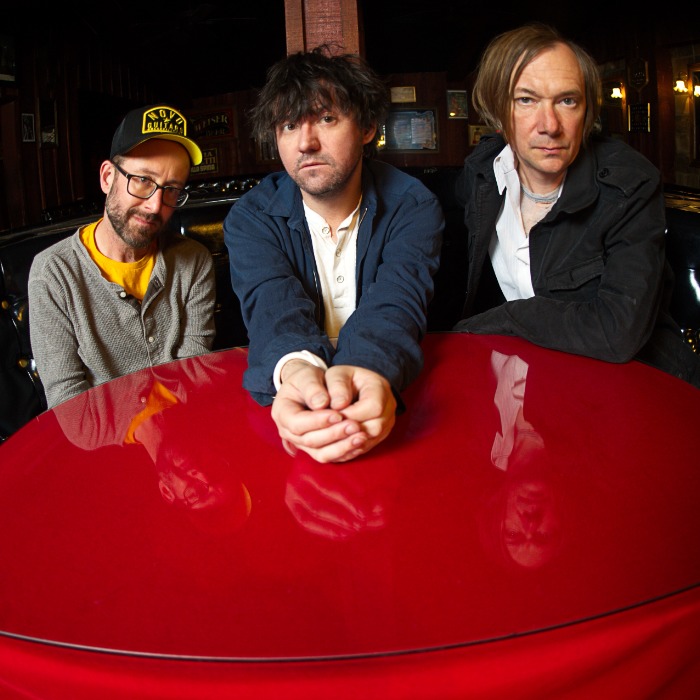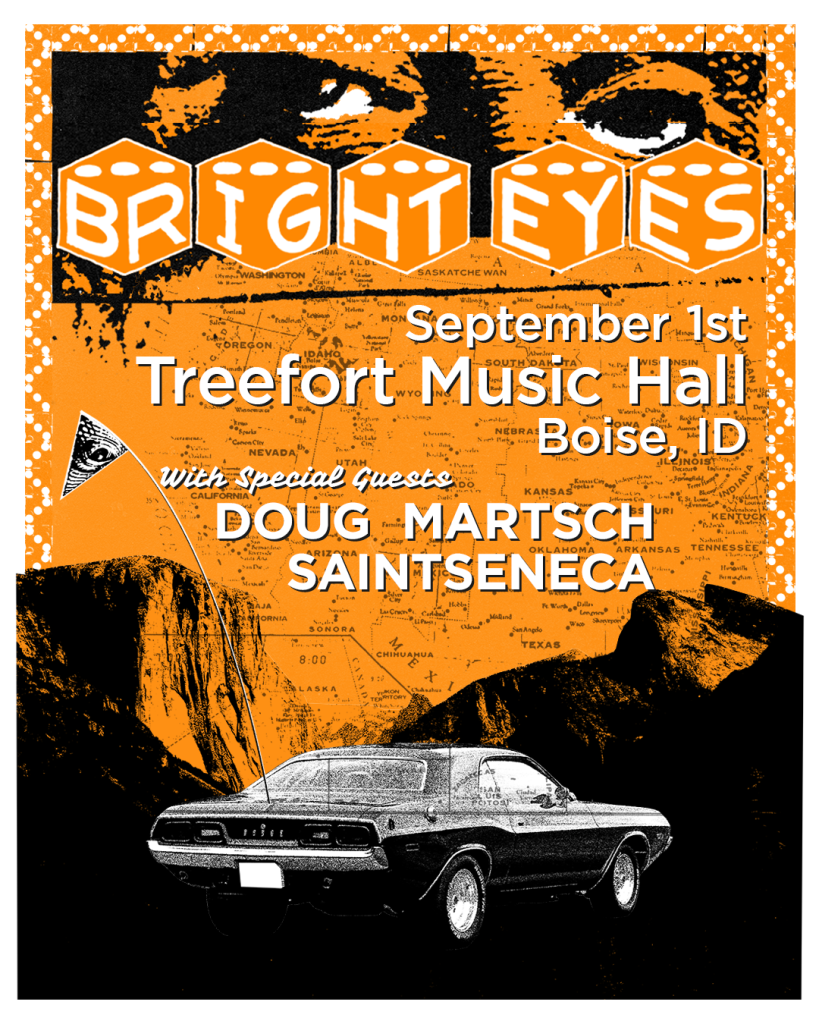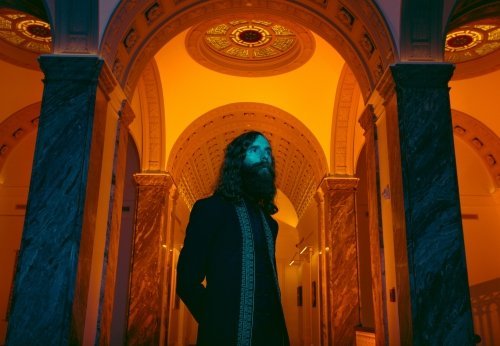Bright Eyes
Monday, September 1st, 2025
Doors: 6PM Show: 7PM All Ages



Five Dice, All Threes is a record of uncommon intensity and tenderness, communal exorcism and personal excavation. These are, of course, qualities that fans have come to expect from Bright Eyes, nearly three decades into their career. The tight-knit band of Conor Oberst, Mike Mogis, and Nate Walcott tends to operate in distinct sweeping movements: each unique in its sound and story but unified by a sense of ambition and ever-growing emotional stakes. Even with this rich history behind them, these new songs exude a visceral thrill like nothing they have attempted before. Oberst has always sung in a voice that conveys a sense of life-or-death gravity. At times throughout Five Dice, All Threes, you may feel worried for him; other times, he may seem like the only one with the clarity to get us out of this mess.
On the self-produced Five Dice, All Threes, Bright Eyes embrace the elusive quality that has made them so enduring and influential across generations and genres, bringing their homespun sound from an Omaha bedroom to devoted audiences around the world. In Oberst’s songwriting lies a promise that our loneliest thoughts and feelings can take on grander shapes when passed between friends, blasted through speakers, or shouted among crowds. This time around, the band invites such like-minded voices onto the record with them, with notable guest appearances from Cat Power (“All Threes”), The National’s Matt Berninger (“The Time I Have Left”), and Alex Orange Drink, the frontman of the New York punk band The So So Glos, who co-wrote several songs and shares a climactic verse in the surging “Rainbow Overpass.”
Despite this range of collaborators, Five Dice, All Threes is as confessional and unguarded as Oberst has sounded in years. Throughout these timelessly constructed yet unabashedly modern songs, he earns his place among a rare class of songwriters who have grown more fearless and boundless with age. In the scenic “Bas Jan Ader”—which takes its title from the 20th century Dutch performance artist whose final act found him sailing into the Atlantic Ocean, never to return—his writing traces the course of a bad memory smoothing out to invite the onset of nostalgia. “I never thought I’d see 45,” he sings to a lapping, chiming melody. “How is it that I’m still alive?” For an artist who has explored unflinching questions of mortality since his teen years, the writing on Five Dive, All Threes conveys a new sense of urgency—and empathy, too.
“For whatever reason, I was born with a brain that’s preoccupied with that kind of thing,” Oberst says of his lifelong penchant for dark subject matter. “When I was young, there was a performative aspect to it, which got reflected back at me. Now I’m at a point where I don’t care what the reaction is going to be. Before it was a little out of my hands—I didn’t know how to write if it wasn’t specific to my actual life. Now I do it by choice.”
Throughout these reflections on the American landscape, Oberst shuttles us from Los Angeles to New York: two cities he has called home and the locations for his recent series of rapturously received, career-spanning solo residencies. Along the course of his journey, he takes shots at tech billionaires and the rise of artificial intelligence; he offers heartfelt wisdom and slips into clipped, surrealist imagery that earns its place among namechecked literary heroes like Vladimir Nabokov and Mark Twain.
For every striking turn in his lyrics, the band knows just how to complement him. On one level, Five Dice, All Threes may be the most fun album in the Bright Eyes catalog, filled with singalong hooks and buzzing performances. “I think it revisits the spirit of our older records,” Walcott says. “There is a real quality of chaos and ecstatic urgency in the performances.” And yet, sitting alongside these adrenalized rockers that sound beamed in directly from the garage, you will find contemplative, psychedelic material like the heartbreaking “Tiny Suicides” and “All Threes,” a song whose jazzy piano solo and free-associative lyrics feel totally unprecedented in the Bright Eyes catalog.
This vivid, cathartic music arrives four years after the band’s 2020 comeback album Down in the Weeds, Where the World Once Was. That record’s zoomed-out lyrics and meticulous studio atmosphere resonated during the peak of COVID lockdown and led to Bright Eyes’ long-awaited return to the road in summer 2021. By this point, they were also deep into their Companions project, in which the band reissued their back catalog via new label Dead Oceans along with newly recorded reinterpretations of material throughout their songbook.
In the aftermath of these exhaustive endeavors, the band felt grateful to be back together and somewhat uncertain about their future. It wasn’t until Oberst invited Alex Orange Drink to stay with him in Los Angeles in winter 2023 when a group of new songs started forming. At first, these back-and-forth sessions on Oberst’s porch were just for fun. Recalling his early days of collaboration and scrappy home-recording, the pair sought to keep each other entertained and inspired, with little thought as to where the material would take them. But after completing gems like the anthemic, self-lacerating “Bells & Whistles” and the punky duet of “Rainbow Overpass,” it became clear that Oberst was tapping into new territory.
When they hit the studio with Oberst’s longtime bandmates—the multi-instrumentalist and producer Mike Mogis, the keyboardist and arranger Nate Walcott—they opted for a fast-paced approach that drew inspiration from formative influences like The Replacements and Frank Black. They sought textures that burst from the mix like gnarly splashes of paint on a blank canvas; they opted for first takes and spontaneous decisions. Referring to 2005’s starkly produced landmark, I’m Wide Awake, It’s Morning, Mogis laughs, “It took us 20 years to make another record that sounds like a band playing live.” But where those songs exposed the raw beauty of the group’s folksier side, Five Dice, All Threes thrashes and squirms and resists classification. In the brilliant expanse of “El Capitan,” they blend a galloping rhythm you might find in a Johnny Cash standard with a swell of funereal horns, shouted vocals, and lyrics that read like a sobering farewell between twin souls. “So they’re burning you an effigy,” Oberst sings. “Well, that happens to me all the time!”
As per usual, the music comes loaded with subtext that invites deep listening—the signature touch of a band who has always honored the album as its own exalted work of art. In the background of these songs, you can piece together a story about love and fate and identity, stitched together from samples of the 1954 Frank Sinatra film Suddenly, a layered orchestra of people sobbing, and a game of dice that borders on cosmic and lends the album its framing device and winking title: In the game of threes, the titular move would indicate a perfect roll. Perfection, however, means something different in the world of Bright Eyes, where our flaws are what grants us authority and finding meaning is only possible if we bear witness to the dark, winding journey to get there. On Five Dice, All Threes, Bright Eyes embrace these beliefs with music that feels thrillingly alive, as if we were all in the room with them, shouting along and gaining the strength to move forward together. It doesn’t just sound like classic Bright Eyes. It sounds like their future, too.

Doug Martsch

Saintseneca
SAINTSENECA
Saintseneca’s Zac Little has been thinking a lot about memory. Not necessarily his memories, though they creep in often, too. Rather, he mulls over the idea of memory itself: its resilience, its haziness, how it slips away as we try to hang on, the way it resurfaces despite our best efforts to forget.
Memory is the common thread running throughout the Columbus folk-punk band’s fourth album, Pillar of Na, arriving in late summer via ANTI- Records. Following 2015’s critically lauded Such Things, the new album’s name is rooted in remembrance, referencing the Genesis story of Lot’s wife who looks back at a burning Sodom after God instructs her not to. She looks back, and God turns her into a pillar of salt. “Na,” meanwhile, is the chemical symbol for sodium. “Nah” is a passive refusal and the universal song word. It means nothing and stands for nothing. It is “as it is.”
Like Lot’s wife, Little cannot help but revisit where—and how—he grew up. Raised in church in southeastern Appalachian Ohio, he took up preaching when he was still a teenager, sometimes in small country settings and other times to congregations of thousands. But these days he’s more interested in listening. And questioning.
Musically, Pillar of Na is Saintseneca’s most ambitious album to date, with Little aiming to incorporate genre elements he’d rarely heard in folk. “I wanted to use the idiom of folk-rock, or whatever you want to call it, and to try to do something that had never been done before,” Little explains. “To reach way back, echoing ancient folk melodies, tie that into punk rock, and then push it into the future. I told Mike Mogis I wanted Violent Femmes meets the new Blade Runner soundtrack. I’m looking for the intersection between Kendrick Lamar and The Fairport Convention.”
“You’re always going to be situated in the folk legacy,” Little continues, acknowledging his past recordings, which include three albums (the aforementioned Such Things, 2014’s Dark Arc, 2011’s Last) and three EPs (2016’s The Mallwalker, 2010’s Grey Flag, and 2009’s self-titled). “But let’s move forward. I’m not trying to make the lost Velvet Underground B-side. I want to find something that has never been heard before, or at least go down trying.”







